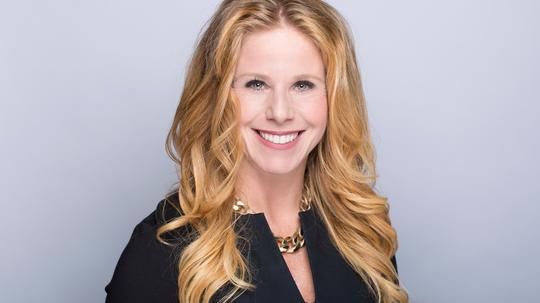
This contributed post is by Tiffany Olson Kleemann, CEO of Arlington-based Distil Networks, a bot detection and mitigation company. She is a former executive at Symantec and FireEye, and was deputy chief of staff for cybersecurity operations under President George W. Bush.
I never imagined my stomach could be tied in knots more than it was on my first day as a cadet at Swab Summer, when the trainers at this Coast Guard version of bootcamp pushed me to my mental and physical limits.
Or the first time I drove a Coast Guard Cutter Ship after getting my qualification as a deck watch officer.
Or my nervous first day in a private-sector job after leaving my decade-long safety net in the military and in D.C.-based posts in the federal government.
But those were a cakewalk compared with my first day as a CEO. I wonder if everyone I met that day in 2017 in the company headquarters in Arlington could tell:
I was scared to death.
CEOs have fearsome responsibility for the company’s business success and employees’ well-being, and it’s a position that only .0007 percent of the U.S. population occupy at a given time. Talk about pressure: 13 percent of chief executives at S&P 500 companies don’t last more than three years, according to a Harvard study.
My first day as a cybersecurity company CEO began much like any other. I worked out at the gym at 5 a.m., raced home to Alexandria to get the kids ready and off to school, and downed that critical first cup of coffee.
Then, I went to the office, with butterflies as large as Andean condors.
But, fortunately, I took a number of steps that I think made that first day much easier and better, and, I hoped, would set myself up for success in the future.
I’d like to share five of them:
1. I did my homework. This actually started before day one. I spoke with board members, the founders and investors to gain a deeper understanding of the company’s objectives and challenges. I sought out mentors and other CEOs for advice. I was fortunate to be able to tap into a wealth of big brains in the D.C. area, including leaders at Virginia’s Center for Innovative Technology, the Arlington Economic Forum and the D.C. offices of Paladin Capital Group and Silicon Valley Bank.
While nothing really prepares you for the job until you’re actually in it, these conversations in the days leading up to the big day made me feel smarter, steadier on my feet and ready to roll.
2. I actively listened. One of my first moves was to conduct one-on-ones with my direct reports to get their perspective on what’s working, what’s not, and how can I help? I went on to schedule meetings or calls over the next few weeks with all 160 employees spread around the world to ask the same questions.
That first day I also conducted a virtual all-hands meeting with employees to introduce myself, instill confidence in our mission and purpose, and reinforce the company’s core values and my belief in them.
On the first day, a CEO should use their ears more than their mouth.
3. I met with the board of directors. While I had the chance to meet board members individually before I was hired, I felt it was important to establish a transparent dialogue and make sure they understood as a group how I operate, right away. I told them I believed in doing the right thing, even when it’s hard, and that if you make customers your true north, everything else will fall into place.
One of the board members then spoke. “Tiffany,” he said, “there are three big jobs for a CEO: Look out for your shareholders and employees, don’t run out of money, and be honest with your board … always.”
Can’t argue with that.
4. I didn’t pretend to have all the answers, or even any answers. Tempting as it can be, I understood it would be a huge mistake to say things just because someone wants to hear it.
For example, I knew that some of the team wanted to hear that the company would continue to operate as usual. Conversely, others wanted to throw out some of the leaders. I couldn’t say or commit to either, because I didn’t know enough yet or didn’t believe it to be true.
The only move I committed to on the first day was conducting those one-on-ones with everyone.
5. I was myself. How many times have we seen it? A person ascends to a very big job and they suddenly become someone else, out of insecurity or just showing their true colors. I tried not to change a thing about myself on that first day (or thereafter).
For example, I am not the type who is going to start a company from scratch with an innovative idea. Rather, my skills and abilities are better suited to a later-stage startup company needing help in reinventing or refining itself to grow, with more structure, processes and empowerment at all levels. I’m more of an operational CEO than an entrepreneurial one.
No one would respect me if I pretended otherwise. CEOs simply have to keep it real.
The end of my first day was the same as most. I picked up my kids from sports practice and had dinner with the family at home in Alexandria. In some private moments later, I looked at my new business cards with “CEO” under my name and reflected on the days ahead. I told myself I may have the title, but as I learned at leadership training in the Coast Guard, I have to earn the team’s respect.




